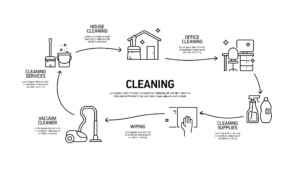Residential Cleaning Business Plan: Steps for Success

Starting a cleaning company is an exciting venture, but success depends on careful preparation. A residential cleaning business plan provides a clear roadmap for how your company will operate, grow, and stand out in a competitive market. Whether you’re launching a one-person startup or scaling a small team, a business plan helps guide decisions, attract clients, and secure funding. For professional resources and industry insights, visit ISSA Residential.
In this post, we’ll explore why a residential cleaning business plan is so important, what to include, and how to put your strategy into action.
Why You Need a Residential Cleaning Business Plan
A strong plan goes beyond a simple idea of “offering cleaning services.” It helps you:
- Clarify goals. Define your short-term and long-term objectives.
- Understand your market. Learn who your clients are and what they value most.
- Plan finances. Budgeting for supplies, staff, marketing, and overhead is crucial.
- Attract funding. Banks, investors, or even landlords often require a plan.
- Stay organized. A clear framework helps you track progress and adjust when needed.
Without a written strategy, it’s easy to overlook details that could make or break your business.

Key Elements of a Residential Cleaning Business Plan
When building your plan, include the following sections:
-
Executive Summary
This is a short overview of your business. It should cover:
- Your mission statement
- The services you provide (e.g., standard cleaning, deep cleaning, move-in/move-out cleaning)
- Your target market
- Key goals (growth, profitability, customer service standards)
-
Market Analysis
Understand your competition and customers:
- Who else provides residential cleaning services in your area?
- What do they charge, and what niches do they serve?
- What sets your business apart?
Pro tip: Consider eco-friendly cleaning, flexible scheduling, or customer loyalty programs as differentiators.
-
Services Offered
Be specific about what you provide. For example:
- Routine housekeeping
- Seasonal deep cleaning
- Specialized services (carpet care, window washing, post-construction cleaning)
This helps clients know exactly what to expect.
-
Marketing & Sales Strategy
Outline how you’ll attract and keep clients:
- A professional website with online booking
- Social media engagement
- Referral or loyalty programs
- Partnerships with local realtors or property managers
For marketing inspiration, explore industry resources at ISSA Residential.
-
Operations Plan
Detail the day-to-day logistics:
- Scheduling and route planning
- Supply and equipment management
- Staffing and training protocols
- Quality control and customer feedback systems
-
Financial Plan
This is one of the most critical parts of your residential cleaning business plan. Include:
- Startup costs (licenses, equipment, insurance)
- Ongoing expenses (supplies, payroll, transportation)
- Revenue projections based on service rates and client volume
- Break-even analysis to determine when you’ll become profitable
-
Training & Certifications
Well-trained employees are your greatest asset. Investing in professional education strengthens your reputation. Explore training and certification options at ISSA Residential.
Best Practices for a Residential Cleaning Business Plan
- Keep it realistic. Avoid overestimating revenue or underestimating expenses.
- Review regularly. Update your plan as your business grows or market trends shift.
- Prioritize professionalism. Build credibility with clear contracts, branded uniforms, and certifications.
- Focus on customer experience. Happy customers bring repeat business and referrals.
External Resources to Support Your Business Plan
- U.S. Small Business Administration (SBA) : Offers free templates and guides for writing business plans.
- Bureau of Labor Statistics (BLS) : Provides industry outlook and wage data that can help with financial planning.
Conclusion
A thoughtful residential cleaning business plan is more than a formality—it’s a foundation for long-term success. By mapping out your goals, strategies, and financial projections, you’ll position your company to thrive in a competitive industry. Combine solid planning with professional training, and you’ll be ready to deliver reliable, high-quality service that keeps clients coming back.
To take the next step, explore training, education, and certifications at ISSA Residential.















